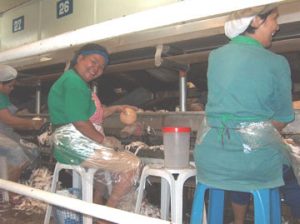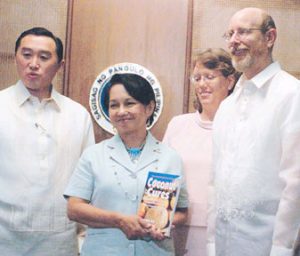An Interview with Dr. Bruce Fife
For several decades coconut oil and other coconut products were villainized by the medical profession and the media. Today coconut is undergoing a revitalization. This once scorned fruit is now being hailed as one of nature's finest health foods. Much of the credit for this transformation can be given to Dr. Bruce Fife, the author of numerous books on coconut. What most people don't know is how coconut oil, the bad boy of dietary fats and oils was transformed seemingly overnight into the "world's healthiest oil." In this interview, Dr. Fife tells us the rest of the coconut story.
You are called "Dr. Coconut." Where did you get this name?
I often travel overseas lecturing on the health benefits of coconut. During my first lecture tour in the Philippines the people, out of appreciation for what I was doing, started calling me Dr. Coconut. Even the newspapers used the term—"Dr. Coconut Visits Manila." The moniker stuck. I like the name and continue to use it myself.
You have been credited as single-handedly bringing awareness of the health benefits of coconut oil to the world and reviving the coconut industry. How did you become interested in coconut?
My interest started about 13 years ago. At that time a colleague told me that coconut oil did not cause heart disease and that it was one of the "good" oils. I couldn't believe it. At this time, I was brainwashed like everyone else, believing that all saturated fats, including coconut oil, were dietary monsters.
My friend cited a few studies that showed coconut oil possessed some medicinal value. I was so intrigued that I began looking up information on coconut oil to either confirm her statement or to reconfirm my beliefs. Since everyone seemed to "know" that coconut oil caused heart disease, I thought it would be easy to find magazine articles discussing the topic. But I couldn't find any. At the time, there weren't any articles on coconut oil. I did find at lot of articles on fats, oils, and nutrition and the only thing they said about coconut oil was that "coconut oil is a saturated fat and causes heart disease." I read this statement in almost every source I found. But none of these sources ever backed up that statement with any facts, figures, or citations to medical studies.
I realized that if I was going to find the truth about coconut oil, I wasn't going to get it from magazine articles or books, because it was apparent that none of these authors know anything about it. The only way I was going to learn the truth was to go to the medical research and see what researchers had to say. I looked up everything I could find on coconut oil, as well as saturated fat, polyunsaturated fat, and related topics. I read hundreds of research articles. What I found was a revelation. I learned that coconut oil was an incredible food with many health benefits. I also learned that it does not promote heart disease but fights against it. I also learned that saturated fat is not the evil villain it has been made out to be and that polyunsaturated fat and hydrogenated vegetable oils were actually the real troublemakers. This went against everything I had previously believed. After analyzing all these medical studies, my beliefs on fats and oils were completely changed.
I was so excited about what I had discovered that I wrote a book to tell others what I learned. The title of the book was Saturated Fat May Save Your Life! The book was published in 1998 and in it I devoted an entire chapter to the health benefits of coconut oil. This was the first book ever published, to my knowledge, that revealed the true character of coconut oil. The book Know Your Fats by Mary Enig, PhD, came out in 2000 and it too contained some positive information about coconut oil. By this time, Robert Atkins, MD, had been promoting the low carb diet for several years and insisted that saturated fats weren't so bad after all, but he said nothing about coconut oil.
You've written several books entirely on coconut. When was your first coconut book written?
In 2000 I published a book titled The Healing Miracles of Coconut Oil. This book has gone through four editions and is now titled The Coconut Oil Miracle. This was the first book published that was devoted entirely to the health and nutritional aspects of coconut oil. Before I published the book I gave a copy of the manuscript to Jon Kabara, PhD, for review. Dr. Kabara is an emeritus professor of chemistry and pharmacology at Michigan State University and a prominent researcher on fats and oils. He had been studying the health effects of coconut oil for nearly 50 years. He told me that my book was factual and accurate, but advised me not to publish it. The reason was that I would be wasting my time; no one would buy the book because they wouldn't believe it. In addition, I would open myself up to a multitude of criticism and ridicule. He had tried for decades to tell people about the goodness of coconut oil but was criticized. So he spoke from experience and wanted to spare me the pain. I ignored his warning and published the book anyway.
Prior to 2000 I don't think I ever saw coconut oil being sold in stores. Were there many stores that sold coconut oil back then?
At the time of publication it was nearly impossible to find coconut oil in local stores. If you were lucky, you might find it sold as a body lotion, but not as a food. I looked everywhere for sources of coconut oil. I was able to find only one reliable source that was being sold for food, and it was refined coconut oil, not virgin coconut oil that is being sold today. Because coconut oil was so hard to find, I included the contact information to this supplier in the book.
Publishing a book that went against the prevailing beliefs of the medical profession was a gutsy move. When your book was initially published, how was it received?
I faced a lot of resistance. Even though I sent out many review copies, the media completely ignored it, so I couldn't get any reviews or publicity. People didn't believe coconut oil could be healthy. I received a lot of criticism accusing me of promoting a dangerous product and often suggesting that I was doing this just to sell coconut products, which I didn't do. I knew from that start that when I published the book I would be criticized, so I took it in stride and didn't let the negative comments bother me.
Sales of the book were very slow. However, if I could get someone to read the book, I gained a convert and they often told their friends about it. So by word of mouth, more than anything else, the book slowly began to sell.
In 2001 a few companies started selling coconut oil over the Internet. They loved my book and sold it along with their oil. The Price-Pottenger Nutrition Foundation and the newly formed Weston A Price Foundation spoke positively of coconut oil in their newsletters. Health food stores slowly began to stock coconut oil on their shelves.
The big breakthrough came when I submitted the book to the editors of Woman's World magazine in 2003. They have a readership of several million. They published an article on coconut oil that had an enormous impact. That single article created an instant demand for coconut throughout the country. All coconut oil suppliers and distributers sold out in a matter of weeks. Coconut oil producers overseas were backlogged for months to fill orders. Those outlets that never sold coconut oil before began to stock it. Coconut oil has been selling well ever since. Today every health food store in the US and Canada sells two, three, four, or more different brands of coconut oil. Even mainstream stores like Safeway and Wal-Mart carry it. The spark of interest from the Woman's World article led to numerous other articles in print and on the Internet.
You've written several additional books on coconut. What led you to write these books?
In my first coconut book I briefly discuss the weight loss aspects of coconut oil. Many people wrote to me to tell me how successful they had been at losing excess weight using coconut oil. I had testimonies and I had the science to back it up, so in 2003 I decided to write an entire book on the topic. This book was titled Eat Fat, Look Thin.
As coconut oil became more popular people contacted me and asked how they could incorporate it into their everyday diets. This led me to write a third book on coconut titled Coconut Lover's Cookbook in 2004.
One of my best selling coconut books, Coconut Cures, came out in 2005. To date, I have written seven books on coconut. Seeing the increased interest in coconut oil, several other authors began writing books on coconut as well. Mary Enig's book Eat Fat, Lose Fat was published in 2005.
What effect have your books had on the coconut industry?
The impact it has had in third world countries has been nothing short of phenomenal. When the soybean industry began its attack on the tropical oils in the mid-1980s, coconut oil sales plummeted. Not only the oil, but all coconut products suffered. Food manufactures began taking the oil and coconut meat out of their products. The market for coconut oil and other coconut products worldwide dried up. Consequently, the coconut industry went into a deep recession. Factories closed down, coconut farms were abandoned, the trucking and shipping industry was adversely affected, literally millions of people found themselves out of work and unable to find employment. In the

Children were growing up in poverty.
island countries of the South Pacific, coconut production contributes to as much as 80% of their economy. So when coconut sales fell, these countries were thrown into an economic depression. In the Philippines, one-third of the population depends on coconut for their livelihoods. That amounts to over 20 million people in just one country alone. The majority of these people barely made a living as it was, and now with the drop in demand for coconut oil and other coconut products the majority were thrust into complete poverty. Many people who could not find work and could not feed or clothe their families became angry.
Their governments were too poor to give much help. This led them to take up arms and rebel against the government and many coups and insurrections occurred as a consequence.
This is the way it remained until my books on coconut hit the market. The books created renewed interest and demand for coconut products. With the rising demand for coconut, factories went back into full production, farmers started harvesting their coconuts, trucking of coconuts got back into full swing. People were going back to work and earning an income and pulling themselves out of poverty.
Parents now had enough money to feed and clothe their families. Children could stop begging in the streets and could go to school instead. The insurgents hiding in the jungles and on mountain tops laid down their guns and came out to work in the fields and factories. They finally got what they were fighting for—an opportunity to support their families. The economy of dozens of countries benefited and so did the political environment.

People are grateful to have employment.
When I went to the Philippines for the first time in 2004, I was treated like a celebrity and everybody seemed to know who I was. I met hundreds of people all thanking me for what I had done for the coconut industry in their country. I autographed copies of my book at an international food trade show and spent many hours signing books. The line to get an autograph was so long that people were going to my wife and having her sign her name in the books because they couldn't get my signature.
It was unreal. I returned the following year and it was the same. But this time I was also invited to the presidential palace and met with Philippine President Gloria Macapagal-Arroyo, who thanked me for the work I was doing with coconuts and the benefit it was having on her country. I've traveled to Jamaica, Fiji, Indonesia, Singapore, Australia, Thailand, Mexico, and even to the Middle East and Europe to share my knowledge about coconuts and speak to very appreciative crowds. I'm still amazed at how a single book has impacted so many lives around the world. For this reason, I continue to research and promote coconut. Not only is coconut improving our health, but it is improving the economy of many countries and helping to bring stability to governments.

Children worldwide are benefiting from increased demand for coconut products
Coconut oil has been a great help to many people in the US and Canada as well. It is a natural product that in many ways is just as good, if not better than many medications. What impact is coconut oil having on the health of people in third world countries?
In many of these poor areas the people can't afford to buy medicines. So the people use traditional remedies or do without. However, with the newfound knowledge of coconut oil's healing properties, people can use it to treat various illnesses without the expense or danger of using drugs. Coconut oil and other coconut products can do so much that drugs aren't necessary in most cases.
Coconut oil and other coconut products are effective in preventing and treating a large number of health problems. I constantly receive testimonials from people telling how they used coconut oil or another coconut product to cure some chronic or acute illnesses or better their health and lives in some way. The reason why coconut oil is still popular and gaining in popularity is because it WORKS! If it didn't, it would have died out long ago, just like numerous health fads that have come and gone in the past.

Left to right: Secretary Yapp, President Arroyo, Leslie and Bruce Fife.
Do you have any more books on coconut in the works?
I'm continually learning more about the wonders of coconut. I just finished a book on the health benefits of coconut water. This book, titled Coconut Water for Health and Healing, was published this past January. Coconut water is an amazing health tonic with benefits that are very much different from the oil or meat, but just as remarkable. At the 2008 BookExpo America—the largest book industry trade show in North America—I had the great honor of being presented a Silver Medal from the Nautilus Book Awards for this book. The nautilus book awards are presented annually to those books which are judged to be the most influential in promoting positive changes in the world and inspiring independent thinking, personal growth, improved wellness, and social change for the better.
I am currently working on three new books that involve coconut in one way or another. My next book will be coming out this August. It's titled Oil Pulling Therapy: Detoxifying and Healing the Body Through Oral Cleansing. I'm really excited about this book. If you think my other books were groundbreaking, wait until you read this one; it will blow you away. You can read about all my books at www.piccadillybooks.com. ■
